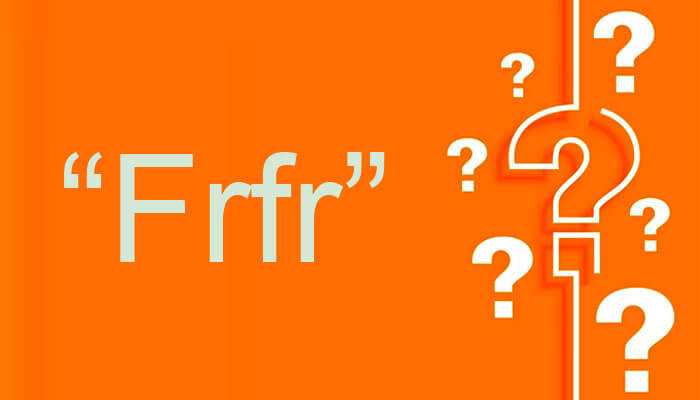Social media and the digital media environment will no doubt continue to develop to keep up with the latest trends in society. There is a constant change in the language. Acronyms and shortcuts are immediately triggered by different types of events and interactions. Hence, they now dictate the shape of society we live in. Amidst all these, terms such as FRFR & FR Meaning in Text seemed to be abbreviations that concisely embody the complexity of current communication. Grasping this result gives a grasp of what drives online discussion and how the language adapts to the digital era.
FRFR and FR might explain the suggestion more reasonably if we dwell closely on their history and utilization in other settings. They speak to the history of these expressions that can be traced to African American Vernacular English (AAVE) and hip-hop culture, where, at first, they were employed to perform an affirmative role in linguistic interactions. With time, the humanizing effect of emotions that dominate in spoken language is slowly shifted to the text, which is, in turn, gaining traction among internet users who use online communication to convey a similar type of emotion as in spoken conversations.
FRFR
In short, “FRFR,” an acronym for “For Real, For Real,” given its emphasis on straight truth, became a synonym for being authentic. The doubling of “for real” helps the speaker reinforce the idea, showing that they mean it seriously and authentically express their statement. Taking my L’s’ came out of a phrase termed African American Vernacular English (AAVE) and has been constantly used in the mainstream online lexicon, especially on social media, e.g., Twitter, Instagram, and TikTok.
The land “FRFR” differs in numerous contexts, such as residential, commercial, or public areas. It will be helpful to understate the statement when things go well. For example, someone may call on it because they need to organize their thoughts according to their belief that they are right and experienced. In face-to-face conversation, the utterance “honestly” joins the listener in sharing a secret, symbolizing the speaker’s trustworthiness and indicating that what they are saying is entirely accurate.
Verbal communication is not the only form of “FRFR” either; it is also often used through texting, comments, and captions. Young people favor Snapchat because its small size and the simplicity of its interface are tailored to the kind of digital communication where fast and casual styles are prioritized. Using “FRFR” is a good way to deliver messages that preserve spontaneity, which helps members of these communities connect and feel close to each other.
FR
Let us now focus on the meaning of FR in the text. “FR” also means “fr,” sharing the root of “frfr,” hence the same meaning. “FR” has one repetition of “for real,” giving it a subtly different feeling. The “FRFR” technique aims at sound-doubling for added emphases, which differs from “FR” by keeping a level of authenticity without sound-doubling for intensity reactions. It is a concise way to express earnestness, and you do not necessarily have to convince the audience with many extras.
“FR” is abbreviated in casual talk; thus, everyone uses it for texting and face-to-face interaction. It commonly occurs as a rapid response, showing that the person on the other end has genuine feelings about what has been said. For goddamn, if someone tells you good news, you might just “FR” it with an exclamation point or smiley face to fully delight in being a friend.
In text messages, “FR” is used widely to say that you agree or are mad, despite the limited characters’ availability. The great fact about the content lies in its simplicity and universality, which enable it to be usable broadly, regardless of the age or ethnic background of the user. That is really the case; be it a text, a post on social media, or a comment thread, “FR” creates an interpersonal relationship by ensuring the validity of expressed words.
Evolution of language in the digital age
The emergence of slang words like “FRFR” and “FR” is only one expression that points us toward the more universal language innovations that occur online. Along with the communication process reaching higher heights facilitated by technology, like everyday talk, language undergoes a semantic change to suit the functions and norms of the digital environment. Acronyms and abbreviations serve as a mechanism for weeding out extra words, saving us the effort of lengthy discussions or keeping others from being misled by our wordiness.
FR and FR are not just abbreviations. What is conveyed in those letters evokes sincerity and honesty, which one would use when speaking personally. From their appearance in the spoken language to their vast embrace of digital text, words and jargon have made their way to hitting the ethical plateau of the internet culture without being restricted to any particular language.
Digital communication is growing, and so is the language. The only thing we will use to move along and talk in our internet spaces now and perhaps in the future is! Besides the changing surroundings, the use of the two terms also portrays how powerful a linguistic device is so that the entire communication system and social relationships become defined and structured in a certain manner.
Then, they become the identities or markers of identification within social networks. Participating in community means interplay among various social groups, ranging from mainstream to subcultures. Hence, those who want to enhance their sense of belonging may use language attributes that refer to dominant groups, such as specific slang terms and expressions. Language, in this case, is the social currency; that is, it creates the chance for like-minded people to communicate with each other while giving the same opportunity for new people to connect and relate to each other.
Nevertheless, a very high degree of linguistic innovation in the digital space may also need help comprehending and interpreting. In contrast, jargon expressions emerge and spread quickly, making it more difficult for strangers to keep up with the latest literature. Also, how one understands the syntax and the semantics of the words may vary concerning context and usage, quickly resulting in misunderstanding and misinterpretation.
Conclusion
As digital language emerges from the fluidity and cross-culture and technology interrelations of the new forms of communication, it is a perpetual translation of language. “FRFR” and “FR” are some terms from the acronyms and slang evolving into a new language that could suit how we communicate today.
“FRFR” stands for a firm or wholehearted belief in truthfulness and sincerity, while “FR” represents a direct and simple means of verifying the truth. As both terms provide an environment of meaningful rapport in the digital world, the words help express their feelings and thoughts with simplicity and immediacy.
The linguistic world is constantly moving, and language changes are taking place faster than ever. Hence, it is critical to understand the proliferation of language in the digital age and how every form of language is essential and very innovative. By providing new expressions, we may grasp their power, enhance our connection, and lead to deeper online alignments with the community. The “FRFR,” “FR,” and other emerging cultural terms borrowed from the digital sphere contribute to the diverse linguistic fabric of global digital communication, with different ways of expressing the various aspects of the modern digital world.




